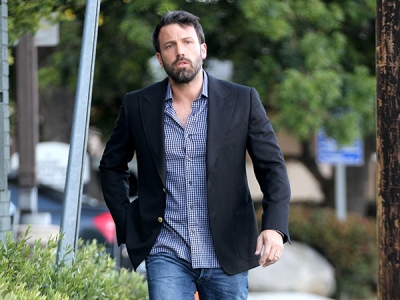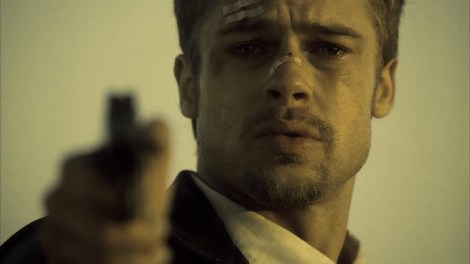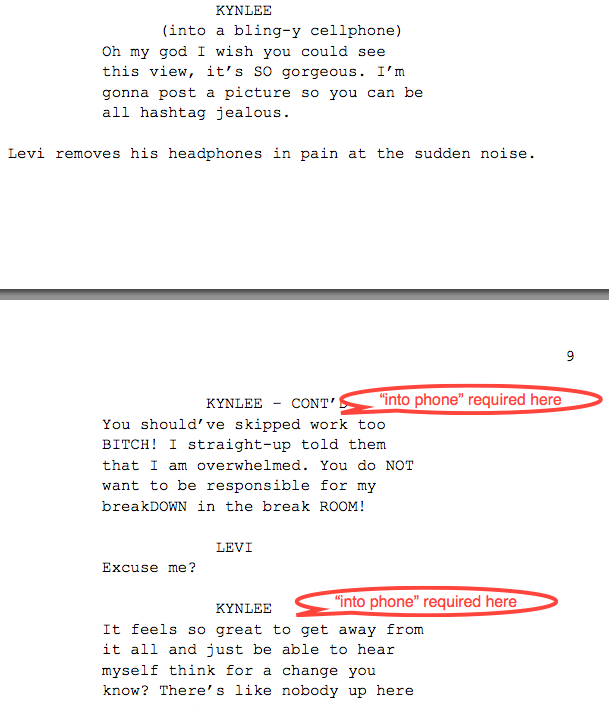Search Results for: day shift
Get Your Script Reviewed On Scriptshadow!: To submit your script for an Amateur Review, send in a PDF of your script, along with the title, genre, logline, and finally, something interesting about yourself and/or your script that you’d like us to post along with the script if reviewed. Use my submission address please: Carsonreeves3@gmail.com. Remember that your script will be posted. If you’re nervous about the effects of a bad review, feel free to use an alias name and/or title. It’s a good idea to resubmit every couple of weeks so your submission stays near the top.
Genre: Action Thriller
Premise (from writer): An amnesiac security officer must solve the mystery of the night he and his daughter went missing in order to find her before the rogue network of sophisticated criminals tracking him.
Why You Should Read (from writer): What I did here is set out to write a script that used the gothic surroundings of Prague as a noir character. While the thematic elements of both Bourne & Taken somewhat inspired what I did here, this is designed for an A-list actor to sink their teeth into because it’s largely the story of one man, who remains the focal point throughout, and his struggle to get his memory back and find his daughter. It’s not conventional in its approach and I’ve been told the ending is wickedly un-Hollywood. Because it’s not exactly conventional, I thought this may be a good discussion piece for the variety of writers on your site.
Writer: Nolan Treaty
Details: 107 pages
 James McAvoy for Sam?
James McAvoy for Sam?
The Followed barely won out an evenly matched Amateur Offerings Weekend. The readers continue to lambast the fact that none of the scripts sound exciting or original. Hey, give these guys a break. It’s hard to come up with a flashy exciting idea. If it wasn’t, everybody would be a millionaire.
But at the same time, I understand their frustration. These loglines do feel a little dull. And while it’s true that it ultimately comes down to execution, it’s much harder to execute the 20 major elements that make up a great screenplay than it is to brainstorm one cool idea.
With that said, the big movie coming out this weekend is John Wick, about as straightforward an action flick as you can get. Let’s hope that taking this same approach turns out well for Nolan Treaty.
30-something Sam has amnesia. And if that’s not bad enough, he’s got some guy named Max calling him every day telling him to get the job done. What job? Sam has to neutralize some target before that target “cripples the system.” Seems a lot to take in for someone who can barely remember his own name.
But Sam soldiers on, listening to this random Max fellow because, we assume, he believes it’s his job to. A few pages later and we learn there’s a big economic summit in Prague and that the SEC director was murdered a few days ago. Now, apparently, whoever murdered him is planning to murder again. That’s what Sam’s trying to prevent. Or so we’re led to believe.
When Sam heads to the hotel where the summit’s being held, he’s stopped by someone named Jakub, who informs Sam that he used to work here! And that the cops are looking for him! Could Sam have been involved in the murder somehow? Jakub assures Sam that the police only want to talk to him, and that he should do so unless he wants to get into more trouble.
Sam also starts remembering something else. He has a daughter! Alison. And she’s gone missing since the big murder. So Sam shifts his focus from taking out the target to looking for his daughter. As all this is going on, Sam keeps getting little flashback memories of his life before the amnesia, which puts all this new information he’s been given into question! When it’s all said and done, Sam will have to trust his own instincts if he wants to save his daughter and the summit.
I was kinda flabbergasted after reading this one. It certainly felt and read like a thriller. It was sparse. There was plenty of mystery. And yet I never once found myself engaged. I always felt like I was standing outside of the story instead of in the middle of it. Figuring out the exact reasons for this proved challenging at first. But I eventually discovered five major problems that plagued the story.
RUSHED – The writing felt rushed to me, as if the writer had watched Taken and The Bourne Identity back-to-back, then wrote this in the next 48 hours. The very thing that makes it read like a thriller (the sparse breezy writing) also hurts it. There’s a lack of specificity. There are so many variables without a constant in sight. So the story felt floaty. Mystery men giving directions. Economic Summits whose existence were never satisfactorily explained. Missing daughter storylines arriving out of nowhere, as if they were thought up on the fly. I apologize to Nolan if this took him a long time to write. But it sure felt to me like it was written quickly.
FAMILIAR – Rushed and familiar usually go hand-in-hand. When you write quickly, you tend to write obviously, which amounts to a lot of clichés and familiar elements. There’s a moment where Sam is attacked by a cop and he does some super cool beat-down move with no idea how he did it. Isn’t that exact same scene from The Bourne Identity?
VAGUE – I’m not sure I ever understood what was going on here. Every plot point was so vague and sparsely explained that instead of gaining clarity as the script went on, I became more confused. I think if Nolan would’ve solidified A FEW PLOT POINTS early, this could’ve been fixed. Look at the screenplay for Unknown White Male. In that script, our main character and his wife check into a hotel together. When his wife goes missing and he finds her at the Gala later, she claims to have no idea who he is. Since we started on solid ground (we knew they were married), this plot development gives us a sensical objective (find out why my wife doesn’t recognize me). In The Followed, we were never on solid ground, so every plot development that came at us just made things more confusing. Starting on shaky ground can work sometimes, as it did in Source Code. But Source Code did a much better job giving us clear answers as the screenplay went on. The Followed appears set on doing the opposite.
GOALS CHANGE – At first the script is about finding out who’s trying to kill this second SEC guy. But then, halfway through, this daughter character enters the picture, and we go through a murky dual-goal period where Sam’s trying to find the target AND his daughter, two seemingly disconnected objectives. Eventually, he stops searching for the target altogether and simply focuses on his daughter, which, quite frankly, wasn’t a very interesting storyline. I never knew the daughter in the first place and therefore didn’t care if she was safe or not.
PLOT NEVER EVOLVED – I remember reading a scene around page 75 with a character sneaking around in a hotel. I then remembered that I’d read a scene around page 10 where a character was sneaking around in a hotel. I paused, thought about it, and realized there had probably been a dozen scenes up to this point of characters sneaking around in hotels. This was a major reason I didn’t enjoy the story. It never evolved. Characters were always doing some variation of the same thing.
When I really look at The Followed, I think the biggest problem is that there’s no intricacy in the plotting. The reveals weren’t solid or exciting enough (a mysterious outfit is taking out several members of the SEC so they can get their own guys in there). And there were too many things left up to question (how does this guy know how to take down police officers? If you lost your memory, why are you taking orders from a random person on the phone?). It was one of those scripts that felt more like a dream than a carefully plotted thriller where every beat connects seamlessly with one another.
I didn’t think The Followed was bad. Just uneventful. It’s the kind of script mistake a lot of intermediates make. They have the skill to write up something that looks and acts like a script. But they don’t put in the hard work to make the story unique and stand out. Unfortunately, The Followed wasn’t for me.
Screenplay link: The Followed
[ ] what the hell did I just read?
[x] wasn’t for me
[ ] worth the read
[ ] impressive
[ ] genius
What I learned: Watch out for word gunk. These are unnecessary words (or groups of words) that gum up sentences and make them difficult to read. Here’s an early sentence in The Followed: “A nervous quality to a more than average all-American guy who should be anything but.” What?? There’s way too much word gunk in here: “…to a more than average…” “…who should be anything but…” This is the epitome of rushed writing. Take a step back and look for ways to simplify this sentence. “Despite his all-American disposition, there’s a nervous quality to Sam.” Simple and easy to read.
Genre: TV show – Drama
Premise: A young ballet actress with a haunting past joins one of the top ballet companies in New York. Once there, she quickly realizes just how competitive the New York ballet scene is.
About: As it became harder for actress Moira Walley-Beckett’s to find acting roles (she had parts in over 35 TV shows), she transitioned into writing, joining writing staffs for a few failed shows before eventually finding a writing gig on the short lived but heavily hyped, Pan Am. That exposure helped her become part of one of the most famous writing staffs in history, that of Breaking Bad. Walley-Beckett actually wrote two of the most talked about episodes in the series – first, Fly, with co-writer Sam Catlin. And then Ozymandias, which is considered to be one of the best television episodes in history. Now that Breaking Bad is over, Walley-Beckett is heading out into the scary world of show creation, where she’ll be the big writer in the room. Does her pilot warrant this promotion? Let’s find out.
Writer: Moira Walley-Beckett
Details: 60 pages
One of the first things you want to look for with any idea is irony, as it continues to be the best way to sell a show/movie. A lawyer who can’t lie. A vegetarian chef opens the best steakhouse in the city. The ballet profession’s dirty little secret – that it’s the most abusive and cruel profession of all. Without irony, you’re forced to cram as much information about your show as possible into the logline to help the consumer get what’s unique about it. And no matter how hard you try, you can never seem to make it all fit.
Taking on ballet’s dirty little secrets felt right for a Breaking Bad alum. That writer’s room was used to dealing with dirty little secrets. But the ticket for this anticipation train comes with an asterisk at the top. Wasn’t this idea just done in movie form a few years ago in Black Swan?
I’m seeing more and more of this as scripted television continues its Big Bang expansion. Instead of looking for new ideas, writers are taking their favorite movies and simply turning them into TV shows.
Did you like Twister? Make a show about storm chasers. Neighbors? Make a show about a frat house. Lucy? Make a show about a secret agent who gets really smart. It’s gotten to the point where writers are being straight up lazy. And the only way lazy entries work is if you can bring something fresh to the idea. The fact that you didn’t work at all to come up with the idea in the first place sheds doubt on this possibility. But I’m going to hold out hope. I’d love to watch the ballet version of Breaking Bad.
When we meet 21 year old Claire Robbins, she’s running away in the middle of the night. What she’s running from is a mystery, but by the look on her face, you can tell it’s haunt-you-for-the-rest-of-your-life bad.
Claire escapes on a train and arrives in New York City the next day, where she knows a total of zero people. Luckily, Claire’s got one hell of a skill to fall back on. Girl can dance. So she heads to one of the best ballet companies in the city, snags an audition, and kills it. She makes it into the troupe.
If you don’t already know, ballet chicks are the most ruthless, the most jealous, the most nasty girls on the planet. Actually, I don’t know if that’s true or not. But that’s the way they were portrayed in Black Swan and since I base all my knowledge in life on movies, I’m assuming this to be fact.
When the other girls figure out how awesome Claire is, they get even more jealous. And when cut-throat bi-sexual troupe leader, Paul, decides to have her headline his next show, well, the jealousy hits an all time high.
Claire somehow makes a couple of friends, including Mia, who spends more time banging random hook-ups than breathing. And Daphne, who secretly works at a strip club in order to afford an apartment overlooking the Hudson River.
Unfortunately, that past she ran away from ends up finding her, a man she shares a terrifying secret with. Will she be able to handle the pressure of New York City and her elite ballet troupe, or will she falter and have to go back to her hometown, where, surely, this horrible secret will continue?
Well, let’s just get this out of the way. Flesh and Bone failed test number 1. It wasn’t fresh. This was almost EXACTLY like Black Swan. A timid little girl. A dance troupe where all the girls hate her. An overbearing troupe leader who uses his power for inappropriate means. The aging girl who sees the new girl as a threat to her spot. Our heroine gets the lead part. We even have a wild night out to a strip club, similar to the famous night out between Natalie Portman and Mila Kunis.
It’s a weakness every writer seems susceptible to. We fall in love with certain movies, and we want to make something similar. So we go in with the best of intentions, oblivious to the fact that our movie/show is the EXACT SAME THING as our favorite movie.
I mean we could literally write a beat for beat remake of Titanic and not know it until someone says, “You do know they already made a movie about the Titanic with a doomed couple that revolved around a missing diamond that sunk with the ship, right?” Ohhhhh, we think as we’re counting future box office receipts in our head. Yeah, I guess I didn’t consider that.
But if you’re able to move past the show’s common bond with the Aronofsky thriller, you’ll find some good stuff. What a TV show allows you to do is explore the more specific areas of a subject matter, enabling you to go beyond the classic movie beats into stuff like bleeding ballet shoes at the end of a dance, pulling an entire toenail off before the next session, and those dirty ugly locker room sessions before and after practice (girls stuffing paper towels into their no-no area because they forgot to bring tampons).
Also, a few of the characters are well-drawn. I liked the sex-crazed Mia. I liked secret stripper Daphne. This easily could’ve devolved into wall-to-wall darkness, which can drown a show (AMC’s “Low Winter Sun”). These two lit things up with their overbearing personalities, a nice contrast to many of the unscrupulous things happening elsewhere in the story.
In fact, there was enough good for me to almost give this a worth the read… until the ending. Now this is a huge spoiler, so turn away if you don’t want to know. But basically, a guy from back home keeps calling Claire throughout the episode, but she keeps avoiding him.
Finally, in the last scene, she answers, and we cut to the caller, Bryan, sitting in Claire’s bedroom back home. After a few exchanges, we realize that Bryan is Claire’s brother. And he’s beating off. To Claire. This is when we learn that Claire ran away from an incestual relationship with her brother. Cut to black.
Uhhhh…SAY WHAT!??
Where the HECK did this come from??? Where was this set up? What in King Joseph’s name happened earlier in the episode to indicate that incest was going to be a theme in this story?
I couldn’t believe that after a pretty well-written pilot, I witnessed a classic rookie mistake. The twist ending that has nothing to do with anything, and is only there for shock value. Twist endings need to be set up with a series of hidden clues to work. We get none of that here, turning the ending into a desperate gimmick rather than an “Oh my God!” moment.
To be honest, I think Moira could’ve saved this pilot with only a slight shift in her approach. One of the friend characters, Daphne, secretly moonlights as a stripper. Why didn’t Moira move this character angle over to Claire??? That’s a hook for a show. A girl at one of the most prestigious dance companies in New York moonlights as a stripper. There’s your irony. Now you have someone who has to hide that world while she becomes a star in the ballet world. I don’t know how long you could keep that going. She might have to quit stripping during the first or second season, but it’s a great place to start a character. Way more interesting (and relevant) than Incest Ballet Chick.
Not a badly written pilot at all. But a few questionable choices kept it from reaching its potential.
[ ] what the hell did I just read?
[x] wasn’t for me
[ ] worth the read
[ ] impressive
[ ] genius
What I learned: The “mystery box past” is a staple in television, and it’s a great way to hook your viewer for future episodes. You simply hint that something bad happened in your hero’s past, and if that something sounds dirty or scandalous or intriguing enough, the viewer will want to tune in for future episodes to find out what it is. We saw it with Scandal (the main character had an affair with the president), we saw it with Lost (with all the characters) and we see it here, with the incest shocker. I didn’t like the incest shocker, but the mystery box past is still a great tool to use when used well.
Get Your Script Reviewed On Scriptshadow!: To submit your script for an Amateur Review, send in a PDF of your script, along with the title, genre, logline, and finally, something interesting about yourself and/or your script that you’d like us to post along with the script if reviewed. Use my submission address please: Carsonreeves3@gmail.com. Remember that your script will be posted. If you’re nervous about the effects of a bad review, feel free to use an alias name and/or title. It’s a good idea to resubmit every couple of weeks so your submission stays near the top.
Genre: Rom-Com
Premise (from writer): A woman with a rare auditory disorder reconsiders her life of solitude when she meets an inquisitive sound engineer (who might just be crazier than she is). But is his interest in her a case of romance…or research?
Why You Should Read (from writer): Did you love “A Beautiful Mind” with Russell Crowe and Jennifer Connelly? Did you secretly wish it had been more like Russell Crowe’s personal life – i.e. funnier, with less math and more assault charges? — If you answered ‘yes’ to both these questions then please consider casting your eyeballs over my RomCom, The Introvert’s Playlist. I’d be grateful for any and all feedback. I’ve already pledged my first born child to BifferSpice in return for his absolutely incredible notes, but if I wind up having twins you’re all welcome to fight over the other one I guess.
Writer: Rachel Woolley
Details: 94 pages
Rachel Woolly, thank you for making me a happy man. When I opened this and saw 95 pages after a full day of work, I praised you and the Dragon Gods of Screenplay Heaven. If I’d opened a script that was more than 110 pages, I don’t know if I would’ve made it to the end. Never, my screenwriting friends, NEVER underestimate the power of a low page count. It can IMMEDIATELY put the reader on your side.
It’s been a weird last couple of weeks with a shockingly low amount of industry news. Even Comic-Con was light on talk-worthy topics. One thing I’m noticing more and more is that I no longer have a go-to site for movie news. It used to be Deadline Hollywood when Nikki Finke was running the show. But now they’re just copying and pasting press releases to keep their feed going. I thought for sure Finke’s new site was going to fill this gap, but her posting has been scarce to say the least. Why did she even start a new site if she wasn’t going to post on it?
This has left me scrounging for tidbits from multiple sites (THR, Variety, Latino-Review, Slash-Film, First Showing, The Playlist, The Wrap). And still I feel like I’m not getting as much movie news as I desire. More and more, sites are dedicating their time to television, which is great. I cover television on Tuesdays as well. But movie news is still the reason I get up in the morning. I’d be curious to hear where you guys browse around. Maybe the ultimate movie news site is out there. Or maybe there’s an opportunity for somebody new to step up and fill the gap. It might even be you.
Okay, let’s clumsily segue into today’s first Rom-Com script in forever on Scriptshadow. Iris, 29, has a rare hearing disorder where simple noises (breathing, ticking, eating) become extremely loud in her head, to the point where it’s like 17 construction companies all decided to build the world’s tallest skyscraper inside of her brain at once.
Naturally, this has made Iris quite anti-social. In fact, she spends most of her time at home, where she can control the noise. But even that’s becoming difficult, as the next door neighbor’s dog is constantly barking his snout off.
As if God hasn’t made her life difficult enough, Iris gets pulled into Jury Duty for an assault case and must sit in a quiet court room all week where simple noises go to breed. The breathing, the coughing, the hacking, the shifting. It’s like bullet holes to her face.
Strangely enough, another audio-obssessed individual happens to be the defendant in the trial. 31 year old Levi is a professional sound recorder who ended up here for supposedly assaulting a ditzy 23 year old who enraged him when she ruined his recording (by taking selfies no less).
Iris is the only one not buying the girl’s story. And after a protracted argument with the other jury members, she finally convinces them to vote Levi innocent. After the trial, Levi finds Iris and wants to thank her for helping him out.
The two get to know each other, and Levi gets a first-class seat on Iris’s insane auditory life. All of Iris’s defense mechanisms are up and she tries to go back to Alonesville so she can live in her safe little bubble again. But wouldn’t you know it, Charming Levi convinces her that love is more important than anything, including annoying breathers.
As I read my way through the first 10 pages of Introvert’s Playlist, I was really impressed. I’d seen some of the comments on the Amateur Offerings post, and while most were praising the writing, many said there were big problems with the story.
Well that wasn’t the story I was reading. The writing here was confident and strong, highlighted with perfect “show don’t tell” scenarios about Iris’s unique disorder (dismantling the waiting room clock at the dentist’s office because it was ticking too loudly). Her writing was also that perfect combination of sparse, yet informative.
But then something happened. A switch was pulled. It’s important for every writer to know when they lose their reader – which story choice broke the suspension of disbelief camel’s back. Because without that knowledge, you can never truly fix your script.
It was page 12 when it happened for me. I had just learned a ton about this unique and intriguing auditory disorder. That alone gave me tons of confidence in the writing because normally when I read a script, the writer’s droning on about something I know EVERYTHING about because I’ve read 20 scripts about the exact same thing over the past month alone. This, however, was new and fresh and different. I was in!
Then we go into this ultra-silly jury case that felt like it was made up on the spot. Having a full 12 member jury for something as insignificant as a simple assault case felt false (especially since it was so clear that the girl was lying). And once that felt false, the introduction of this entire Levi-Iris relationship felt false. And since I had to buy into that relationship in order to buy into the rest of the script, this scene ensured that I wouldn’t get into the rest of the script.
I think writers forget this. That certain scenes in scripts are so critical, that if they don’t work, they ensure dozens of other scenes won’t work either. When you’re setting up your key relationship, even in a comedy, that’s a scene you have to get right. And an overly silly court case isn’t right. There’s no truth to that scene. And when the reader senses a lack of truth, they stop trusting you.
If I were Rachel, this whole court scene is the first thing I’d ditch. Figure out another way for these two to meet each other. Make it more natural. Make it honest. Because this moment is the infrastructure for everything that happens after it. I actually wondered why Rachel didn’t put Iris up in the mountains in place of Assault Girl. This seems like a place Iris would go (to escape the noise) and therefore a more natural place for her to run into Levi.
The other big issue I had was with Iris herself. And I sympathize with Rachel because I know the balancing act she was trying to pull off here. But whatever way you cut it, Iris is equal parts sympathetic and annoying. We feel for her because we know what she’s going through. But it’s kind of like the complainer girl in a group of friends, the one who’s always too cold and she lets you know it? The first time you hear her say it, you feel bad for her. The second time, less so. The third time, it’s a little annoying. The fourth time, really annoying. And after that you just want to strangle her.
There’s a little of that going on here. I feel bad for Iris’s situation, but there were times where I just wanted to say, “Get over it!” Every script has one big balancing act you have to pull off, and I think this is Playlist’s. You have to convince an audience to sympathize with someone who’s annoyed by something no one else finds annoying. Not an easy task.
Now with all that said, there’s some quality writing here and I do see some promise in the story itself. But it needs more truth. I say ditch the over-manufactured court stuff and tell a simpler story about a unique couple. Focus on exploring the characters, not some overcooked plot. I see this as more of an indie film due to the quirkiness of our heroes, so I’d play it more drama-comedy than comedy-drama. Somewhere in the tone of Lake Bell’s “In A World.” That’d be my advice on where to go. I wish Rachel the best of luck. ☺
Script link: The Introvert’s Playlist
[ ] what the hell did I just read?
[x] wasn’t for me
[ ] worth the read
[ ] impressive
[ ] genius
What I learned: Despite my early rant about page count, page count should always be dictated by story. Several key factors will play a hand in whether your script should top out at 90 pages or 120 pages. The main two are genre and character. Fast and loose genres like Thrillers and Comedies will be around 100 pages. Thicker and more introspective genres like Period Pieces, Real Life Drama or book adaptations, can easily top out at 120. If your story has a high character count (Zero Dark 30), you’re going to need more room to fit them all in. And if you’re doing some major character exploration and/or character development (Silver Linings Playbook), you’re going to also need more pages. Then there are the miscellaneous things. Big world-building stuff (Guradians of the Galaxy) will need space, as will really elaborate plots (Burn After Reading, American Hustle). In the end, take in all this information and figure out if you need a lot of space to tell your story or not that much. Be honest with yourself, give yourself a page goal ahead of time, then try to hit it.
What I learned 2: Always put “INTO PHONE” (or “ON PHONE”) in parentheticals when a character is on the phone. Not just the first time they speak but on all of their phone dialogue lines. This is ESPECIALLY important if you’re intercutting a conversation with a third party. That’s where things start getting confusing for the reader. When Kynlee was on her phone AND having a separate conversation with Levi, I wasn’t clear who she was talking to. Here’s the first part of the exchange in question.
Genre: TV Pilot – Drama
Premise: Set in Boston in the 60s, a squeaky clean FBI officer is asked to turn an underdog Irish gangster into an informant in an attempt to take down the Italian mafia.
About: This was a huge project coming out of Fox, as it was to be directed by Ben Affleck (you know, the whole Boston connection thing). But the reality was that after Argo won the Oscar, Ben became overcommitted. Then the whole Batman thing happened and he was really overcommitted. Doesn’t Ben realize that every time he leaves a project, he destroys a writer’s dream? Glenn Gordon Caron has a few nice credits under his belt (Moonlighting, Medium), but this was a potential career-maker. It would’ve taken him to another level. Ahh, Hollywood. Timing is everything.
Writer: Glenn Gordon Caron
Details: 56 pages – Revised First Draft (8/26/13)
I go into these scripts with a prejudice. I can’t help it. It’s much the same prejudice I go into a romantic comedy with. Which is that I know it’s probably going to be the same old song and dance. There’s going to be a tough sounding Jersey-accented voice over guy. There’ll be several scenes where the local mob offers to “protect” folks. There will be dirty cops. Some snazzy-dressed gangster is going enjoy his meal at the best table in the best restaurant in town. It’s like everybody who’s ever seen Goodfellas wants to show you that they can write Goodfellas too.
Except I don’t want to see Goodfellas again. I already saw Goodfellas. I want something new. And this is what every writer needs to tattoo backwards to their forehead (so they can read it in the mirror, of course) – you gotta give us something different. You can’t come in with the same old angle and expect us to care.
So color me surprised when, ten lines into that expected voice over, our narrator informed us that he was nine years dead. Hmm, I thought. Haven’t seen that before. Sure, it’s a small thing, but it gave me trust. It helped me know that this writer was actually TRYING as opposed to APEING. Surprise a seasoned reader, that gets you ten more pages easy. And assuming you keep surprising us, we’re along for the whole ride. So how was that ride?
It’s present day when we meet 80-something barely-alive Mickey Flood, who’s been terrorizing Boston for 50 years and finally paying his dues for it in court. We’re learning this from Rudy, our narrator, who tells us he and Mickey used to work together.
The two met when Mickey saved Rudy’s life as a kid, just as a bunch of older kids were getting ready to throw him off a roof. It wasn’t until 20 years later (the 60s), that they met again, with Mickey being a low-rent gangster and the straight-laced Rudy coming home as a member of the FBI.
It just so happened that president Kennedy was enacting a new coda for crime-fighting – converting criminals to informants. And that was Rudy’s first job – to find a criminal and strike up a relationship with him that helped the FBI take down other bad guys. Naturally, Rudy went to his old friend, Mickey, who had no problem giving up tidbits on the Italian mob, since they were technically his competition.
Meanwhile, an entitled businessman named Grayson refuses to pay Mickey back the money he loaned him. Mickey, of course, threatens his life as a result. Grayson doesn’t like some two-bit gangster wannabe telling him what to do, so he goes to the Feds for protection. They tell him if he testifies in court against Mickey, they’ll protect him. Grayson says fine. In the meantime, Rudy is pleading with the FBI to let Mickey be his informant, something they’re not sure they want to do.
But when Mickey tells the cops when the Italians are planning a major supermarket heist, they change their minds. And Mickey gets a little bonus for it. The Feds leave Grayson alone between shifts just long enough for Mickey to squeeze in there and squeeze the life out of the cheating bastard. It’s the beginning of a unique friendship between a criminal and a bureau agent that will last a long time, and shape much of the criminal underworld in Boston.
 “Dude, I said leave me alone. I’m not going to direct your TV show.”
“Dude, I said leave me alone. I’m not going to direct your TV show.”
Like I said, there aren’t too many ways to make this genre different. So how do you do it? Well, you do it with little surprises, like our narrator being dead. That was a nice touch. But I realized that the ultimate goal here isn’t much different from any story. You want to keep them hooked long enough to fall in love with your characters. Because once the reader’s in love with your characters, you got’em for the long haul.
And that’s what happened with me. Mickey Flood is introduced as this despicable human being. Here he is, in court, 85 years old, barely able to breathe, being convicted of dozens of murders, and he’s still able to stand up and call the judge a piece of shit.
I was curious how they were going to get us to care about this guy, but they did it rather simply. Once we flash back, they establish Mickey as an underdog. He wasn’t someone born into this business. He didn’t have the contacts to get him into “the family.” He was considered a cheap pale imitation (literally, as he was Irish) whose name didn’t deserve to be uttered in the same breath as real mobsters.
It’s this disrespect from his peers that helps us forget that asshole in the courtroom and start to sympathize with this guy. It didn’t hurt that he saved our hero from death as a child (an unapologetic save the cat moment if there ever was one). But clearly, we felt that there was more to this guy than your average cliché gangster and we liked that.
Also, when you write these pilots, there are a couple of things you need to pay attention to besides the characters and plot. I’ll get into the second thing in the “What I learned” section, but the big one is that your pilot has to be ABOUT SOMETHING SPECIFIC, particularly if you’re exploring a general area, like crime. Lost and Walking Dead and Breaking Bad all have the unique angles built into their premises, but the criminal underworld of the 60s is still too vague. We need that extra “specific angle” to explore.
Here, it’s informants. We know that because it’s brought up over and over again – how informants are the wave of the future. How the president himself wants the Feds to make them a priority. This is what takes this from being “just another Mob show/flick” to a more specific angle we can explore over the course of the series. This is going to be about the tricky relationship between an FBI agent and his informant.
If you’re not exploring some unique angle in your pilot, chances are it’s going to feel thin. C.S.I. is about the use of unique forensic tech to solve cases. Seinfeld was about the mundane minutia of every day life. What unique angle are you exploring in your TV show?
In the end, this script gets it right. It manages to have a lot going on, yet never to the point where it confuses the story (that’s really hard to do!). It makes you like and care about the key characters. And it feels just different enough from other scripts in the genre to feel fresh. I can totally see why Affleck wanted to do it. Whether we’ll ever see it from another director, however, is a question I can’t answer. That’s the weird thing about the TV world. Once something’s dead, it’s usually dead for good. But this is too good to get thrown in the trash. I think it deserves a shot.
[ ] what the hell did I just read?
[ ] wasn’t for me
[x] worth the read
[ ] impressive
[ ] genius
What I learned: In a TV script (and for the most part, feature scripts as well), you’ll have your “public” plot and your “personal” plot. The public plot here is getting Rudy from San Francisco to Boston so he can meet Mickey again and start their informant relationship. All of that is great, but we won’t care if you haven’t executed your PERSONAL plot. This is the plot taking place in your main character’s personal life. It’s what allows us to get to know him/her on a personal level, and therefore feel close enough to him to care about what he’s doing. In most cases, it’s a romantic or family plotline, with some sort of conflict or drama going on. So here, Rudy’s met this girl, but he’s not ready to take the next step with her, and leaves her behind when he goes back to Boston. She, of course, shows up later, telling him that she’s preggies (how’s that for informing, Rudester!). His world is rocked, and now he must figure out how to deal with this. What the really good writers do, is they find a way to weave these two plotlines together so they feel like one seamless entity. So at the end here, Rudy must go to Mickey for help in regards to his girlfriend’s pregnancy. Mickey strikes a deal with him that helps take care of the pregnancy, while giving him (Mickey) a second life.
 “Okay, that’s it! Do you know who I am? I’m Ben Affleck! I don’t do TV anymore! Got it! What part of ‘two Academy Awards’ don’t you understand? A marriage… needs work. It needs work, okay….”
“Okay, that’s it! Do you know who I am? I’m Ben Affleck! I don’t do TV anymore! Got it! What part of ‘two Academy Awards’ don’t you understand? A marriage… needs work. It needs work, okay….”
Get Your Script Reviewed On Scriptshadow!: To submit your script for an Amateur Review, send in a PDF of your script, along with the title, genre, logline, and finally, something interesting about yourself and/or your script that you’d like us to post along with the script if reviewed. Use my submission address please: Carsonreeves3@gmail.com. Remember that your script will be posted. If you’re nervous about the effects of a bad review, feel free to use an alias name and/or title. It’s a good idea to resubmit every couple of weeks so your submission stays near the top.
Genre: Drama/Thriller
Premise (from writer): When a professional contract killer discovers he’s become the target of an assassination himself, he teams up with the would-be killer to figure out who set them up.
Why You Should Read (from writer): Been a screenwriter for a certain number of years, written some amount of screenplays, placed in various categories of various competitions, and done other unspecific things. But why should you read this specific script? I don’t know. Because I think it’s a decent script. Because I’m genuinely curious what kind of bashing Carson gives it. Also, this was a top 10 script in the Industry Insider Competition – Roger Avary round. No, it did not win the coveted honor of first place, but Fargo also lost best picture to The English Patient, so clearly people do make mistakes.
Writer: Matt Williams
Details: 114 pages
 I don’t use Brad Pitt lightly for these posts, but he’d be perfect for this.
I don’t use Brad Pitt lightly for these posts, but he’d be perfect for this.
Ugh. Another hitman script.
In the immortal words of Darth Vader: “NOOOOOOOOOOOOOO-OOOOOOOOO!”
Has there ever been a hitman script that didn’t follow the exact same formula as every other hitman script? A cursory glance through my memory banks says, “Nuh-uh.” And thus I’m stuck eye-muscling my way through yet another generic story with yet another generic outcome.
Unless! Unless, The Savage South locates the hitman-script-miracle-serum and injects itself before it’s too late. Maybe with the help of Kevin Costner? Hey, didn’t I just write an article about positivity yesterday? Shouldn’t I have hope? Shouldn’t I be channeling the sweet-sounding hum of Nutty Australian Lady’s soothing voice? Please, I want more money to show up in my mailbox!
40-something Jeff Hollis is a hitman in New Orleans haunted by his gangster father’s murder of his mother. He works mainly for a group called the Dixie Mafia. And while you’d hope there was something unique about this deep south band of criminals, they’re really no different from any other mafia. They do unsavory things. They make a lot of dirty money. And if someone steps out of line, they call on old Hollis to put a bullet in their cranium.
Except one day, all of that changes. Hollis’s boss, Myron, tells him to make a pick-up for him, a job he doesn’t typically do. When Hollis gets there, he meets Eddie, a pathetic sort who confesses that he’s been sent here to kill Hollis but can’t go through with it. By whom, Hollis asks. Hollis is shocked to learn the trail leads back to the man he trusts the most, his boss and friend, Myron.
So Hollis grabs Eddie and they go to kill Myron. But just as Hollis is about to pull the trigger, Myron asks Hollis why he (Myron) would send the most inadequate hitman in history to kill him? Hollis takes pause. It does seem rather strange. Myron goes on to say it’s because he wanted Hollis to live. He was actually following an order from the leader of the Dixie Mafia, the reclusive Dominic, an order he couldn’t refuse unless he wanted to end up sans life.
So Hollis and Eddie go to find this guy, only to learn that Dominic has sicked the number one hitman in the country on Hollis, a bad motherfucker known as The Irishman. And if that weren’t bad enough, there’s a cop named Kessler who’s chasing Eddie for another murder entirely. In other words, there ain’t a lot of wiggle room in this pursuit.
Along the way, Hollis learns about the elaborate string of secrets and lies that led to his mother’s death, and how they had nothing to do with his father, but rather all point back to Dominic. Problem is, finding this guy is impossible. That is until an unlikely ally joins Hollis at the last second, prepared to help him achieve the justice he deserves.
 More on this picture in a second.
More on this picture in a second.
What the hell. This was really good!
To be honest, I was a little dreary-eyed at first. The script took its time getting started. And that’s its biggest weakness. I eventually realized that all the early scenes are setting up the cast of characters, which eventually pay off. The thing is, I’ve read so many scripts where writers do this only for things NEVER to pay off, that I didn’t trust they would here either. Once I realized this was the real deal, I actually went back and re-read a lot of the early scenes.
The strength of this script is in its incredible plotting. Every piece of information is important. Every twist and turn has a purpose. And every character is in the script for a reason. There were two hook points for me. The first was when Hollis gets set up. That’s when I sat up (literally) and said, “Hmmm, okay, I’m intrigued now,” (around page 27) and the second is when Myron explains to Hollis the much bigger plan going on (around page 60 – the mid-point shift). That’s when I officially said, “Okay, I’m in it now.” I honestly haven’t read a script this well plotted, amateur or pro, in a long time.
In fact, I want to do something today that I don’t usually do. I want to speak directly to the writer, because I feel like if he can fix some of this stuff, he can really have a special script here. So these are the things I felt needed work.
The first act – The opening scene was good. It catches our interest and makes us want to find out who these guys are. But after that, I was bored for 25 pages. I just kept meeting people who didn’t seem important at the time. Hollis kills a man who seems insignificant. Hollis talks to a bunch of people in rooms. Kessler talks to people in rooms as well. I think readers are going to zone out somewhere in the first 30 and start skimming on you. Either move these scenes along faster, condense this section, or make it more entertaining. I don’t know if the scenes need more conflict, a bigger mystery box, more suspense, or what. But I didn’t get hooked until Hollis and Eddie met.
You can do more with Eddie – I think I know what you’re going for here. You’re trying to make Eddie the lovable loser. The guy who we’re hoping we’ll figure his life out. While the backstory with Eddie and his family is good, Eddie is eventually relegated to the “question-asker” character (see Ellen Page in Inception), someone to have around so our main character, Hollis, can bounce exposition off him. I don’t think Eddie needs to be the outrageous comic relief or anything (Kevin Hart), but he needs more personality. He needs to stand out somehow.
The Irishman must be bigger – As I was writing the above plot synopsis, I started writing this line: “The Irishman is a hitman that would make even Quentin Tarantino blush.” But then I realized that wasn’t true. He wasn’t unique enough. Wasn’t big enough. The Irishman is a solid bad guy, but he’s nowhere near as nuts as he could be. You need to think Anton Chigurh territory, maybe not that bizarre but definitely that memorable. This guy slits the throat of a patron who mouthed off to him. That doesn’t even make sense (he’s endangering his mission, since the waitress would’ve tipped off the police on who to look for). I believe you’re capable of writing someone a lot more original.
Kessler – While I understand that Kessler’s cutaway storyline adds a sense of urgency (someone chasing Hollis), I never really believed he was going to be a problem for Hollis. Maybe it’s because of that opening scene, when we see that Hollis clearly has him under control, or maybe it’s because Kessler’s too “light.” That and his scenes aren’t very interesting. You can boil them down to a dozen variations of “Do you know where Hollis is?” Just like Eddie, just like the Irishman, Kessler’s gotta have more shit going on. I don’t know if he needs to be reckless or dirty or unpredictable, but if he’s this perfect polite cop who only exists to give us something to cut away to, I’d rather not see him in the story. We have to make this guy more watchable. (crazy thought: Maybe make him a woman instead? Pitch it to Brad Pitt’s people as a way for Brad and Angelina to work together?)
The Dixie Mafia – Finally, I want to know more about and feel more of the Dixie Mafia. What’s different about these guys? What do they do that other mafias don’t? Find out what’s unique about them and exploit it. Remember that if you’re not exploiting the very things that are different about your story, then what’s the point of including them in the first place? Why not make them the Russian mob or the Italian mob? Do a little research, find out what makes this mob tick, and then slather your story in it. Because that’s one of the reasons I was checking out early. Things felt too generic – like every other hitman/mafia script I’d read.
Matt Williams, thank you for surprising me today. I had a long day (met some great Scriptshadow readers for 3 hours but they tired me out!) and was three-limbs into bed before this nice little gem pulled me back out. It’s not quite there yet, but dammit it could be. This was a cool script, and something that’s certainly worth checking out.
Script link: The Savage South
[ ] what the hell did I just read?
[ ] wasn’t for me
[xx] worth the read
[ ] impressive
[ ] genius
What I learned: Remember that if all the good stuff happens later in your script, you’re probably in trouble. Readers love to start skimming once they get bored. So you gotta grab them from the start and never let go. If you have a heavily plotted script like The Savage South and you need that first act to set up a lot of stuff, that’s fine, but REMEMBER TO MAKE THOSE SCENES ENTERTAINING AS WELL, AND NOT JUST SET-UP. Each scene should be a story in itself that you’re trying to entertain a reader with. If three scenes go by that are all set-up and no entertainment, that’s pretty much it for you. Whether they keep reading or not, the reader has mentally given up on you.





